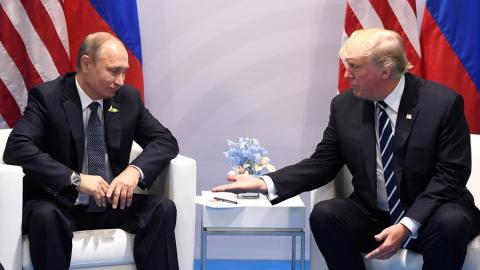This week in 1784, the Awa’uq Massacre took place near Kodiak Island, Alaska. Russian colonists killed hundreds of Koniag Alutiiq men, women, and children, marking one of the darkest chapters in Alaska’s history. One survivor later recalled that the “stench of the corpses lying on the shore polluted the air so badly” that it was impossible to remain at the site.
Two hundred forty-one years later, another Russian butcher will be visiting Alaska this week—President Vladimir Putin—meeting with President Trump to discuss how to end the war in Ukraine.
On the campaign trail, Trump made ending Russia's war against Ukraine one of his top foreign policy priorities. In office, he has found the task far more difficult than he envisioned.
Ukrainian President Volodymyr Zelenskyy has repeatedly agreed to Trump’s calls for ceasefires and even signed a historic minerals agreement with the United States. Putin, meanwhile, has worked to undermine the process at every turn, targeting civilians in major cities and disregarding American calls for a ceasefire. Zelensky remains the primary enabler of peace; Putin remains the main obstacle.
Since Russia’s invasion in 2022, Ukrainians have shown remarkable resilience, reclaiming over half the territory Russia initially seized. Ideally, the U.S. and its allies would provide Ukraine with all the weapons and support needed to win outright, not just survive. Neither President Biden nor President Trump has been willing to do this. Therefore, the best realistic outcome is a fair and just peace that Ukraine deserves.
As President Trump speaks with Vladimir Putin over the future of Ukraine, he should have two red lines in mind that must not be crossed. First, the United States should never formally recognize Russian legal control over the Ukrainian regions it currently occupies. There might be a de facto acknowledgment of Russia’s presence on the ground, but there should be no de jure recognition of these lands as part of the Russian Federation. Second, Ukraine must maintain its sovereignty, including its right to determine the size and structure of its armed forces, how and by whom it is governed, when to hold elections, the international organizations it chooses to join, and the allies and partners with whom it cooperates.
Trump also needs to start applying real pressure on Moscow to bring it to the table with Ukraine. In recent months, he has set multiple deadlines for Russia to negotiate, all of which have passed without meaningful consequence. Instead of confronting Moscow directly, his administration has tinkered at the margins—such as placing tariffs on India for buying Russian oil—while leaving the core of Russia’s war effort untouched. This must change.
The White House also must be mindful of the propaganda value of a Putin visit to Alaska. Many Russian politicians have made irredentist claims to the state, and a popular myth in Russia holds that the 1867 sale of Alaska was only a 99-year lease. Billboards in Russia even depict maps showing Alaska as Russian territory.
Finally, Trump must avoid sidelining U.S. allies and partners, especially Ukraine. The ideal scenario would include Zelenskyy joining the talks in Alaska. If that does not happen, Trump should immediately fly to Europe to brief key European leaders and Zelenskyy. Putin will look for any opportunity to drive a wedge between Washington and its European allies. The U.S. should deny him that chance.
The outcome of the Russia-Ukraine war will be a defining element of Trump’s legacy and will shape the future of the transatlantic community. Right now, he has an opportunity to secure his place in history not only as a dealmaker but also as a leader who strengthened America’s alliances and advanced U.S. national interests.
The Alaska meeting could be one of the most consequential events of Trump’s second term. If handled well, it could start a diplomatic process leading to a fair outcome for Ukraine. But Trump must be willing to walk away if the terms are unacceptable—just as he did with North Korean leader Kim Jong-un during his first term. With Putin, no deal is better than a bad deal.
Ukraine is ready for a fair peace. Now it is up to Trump to apply the necessary pressure on Russia to bring Putin to the table alongside Ukraine. The upcoming meeting in Alaska is a good place to start.



















